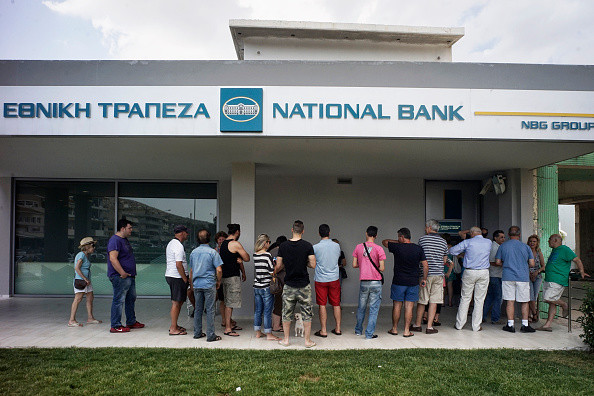Greek debt crisis: Banks to remain closed until bailout referendum

The Greek government announced early Monday (29 June) that it has decided to keep its banks closed for a week until after the referendum on 5 July and to limit withdrawals from ATM machines to €60 (£40).
Cash machines are not expected to reopen until Tuesday. However, foreign tourists will be exempt from the cash withdrawal restriction, according to an official government decree published in the early hours of Monday morning, said AFP.
The emergency measure was announced after the European Central Bank (ECB) refused to increasing additional funding to the country.
Scores of Greeks have been queuing up at the cash machines over the weekend over fears that Greece is inching closer to an exit from the Eurozone. Greece must repay €1.6bn (£1.1bn) to the IMF before 30 June.
The decree on capital controls, published in the official government gazette, lists the measures imposed on financial institutions lasting 28 June to 6 July and was signed by President Prokopis Pavlopoulos and Prime Minister Alexis Tsipiras.
This includes a ban on money transfers overseas, except for vital, pre-approved commercial transactions, the BBC reported.
It said the move was necessary due to "the extremely urgent and unforeseen need to protect the Greek financial system and the Greek economy due to the lack of liquidity caused by the Eurogroup's decision on 27 June to refuse the extension of the loan agreement with Greece."
In his televised address on Sunday, Tsipras squarely blamed his European partners for Greece's current situation.
Tsipris had accused the Eurozone and the ECB of trying to blackmail the will of the Greek people in hindering the democratic process of holding a referendum on the terms of the bailout.
He said he has sent a short extension request again to the President of the European Council and to the 18 heads of the state of the Eurozone, as well as to the heads of the ECB, the European Commission and the European Parliament.
"I am awaiting their immediate response to this fundamentally democratic request." He said they are the only ones who can reverse the Eurogroup's decision and enable the ECB to restore liquidity to the banks."
The Athens Stock Exchange will also remain shut today (29 June).
"The knee-jerk reaction is for flight out of the euro and into safety. Defaulting to the IMF tomorrow looks like a certainty and when that happens there is no proposal, there is no legal mandate for Europe to bail out Greece. There are a whole bunch of unknown unknowns," a senior currency strategist at ANZ Bank New Zealand told Bloomberg News.
Banks are likely to be reopened on 6 or 7 July after the Greeks vote in the referendum on the terms offered by the international creditors. Tspiras has called for an overwhelming "no" vote at the referendum.
Jeroen Dijsselbloem, the Dutch finance minister who heads the committee of Eurozone finance ministers, said that with Greece's referendum plan, Tsipras was thrusting Athens into a mess from which it would struggle to recover.
"We are millimetres away from the total collapse of the Greek financial system," Herman Van Rompuy, the former president of the European Council. "It's actually suicide that's taking place in Greece right now," he said, according to the Guardian.
The dramatic move in the Greek financial crisis has already been felt in the early Asian trading with euro falling as much as 1.9% against dollar.
© Copyright IBTimes 2025. All rights reserved.






















